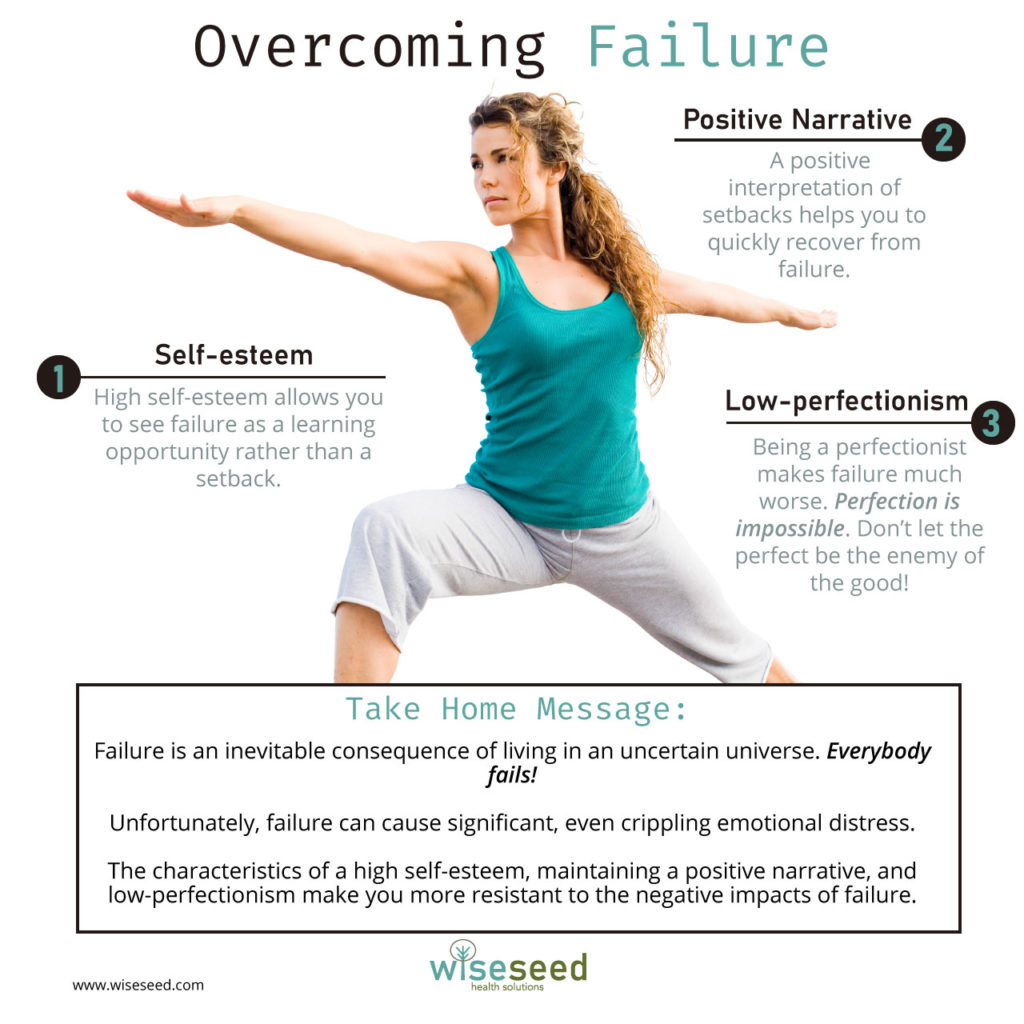Overcoming Failure

“It’s better to be in the arena, getting stomped by the bull, than to be up in the stands or out in the parking lot.” From “The War of Art” by Steven Pressfield
Introduction
Failure is a brute fact of human existence. For this reason, we believe that overcoming failure is an essential life skill that you need to master in order to flourish and be happy.
So far, we’ve canvassed a variety of resilience strategies to help you adapt to many of the challenges you are likely to encounter, including the consequences of COVID-19, academic performance, health issues, and ageing. You can find all of our resilience articles in our online library here.
One area that we haven’t covered is how best to confront failure and its associated emotional pain. And failure can be very painful indeed! Therefore in today’s article, we explore three characteristics that may help you overcome failure and get back in the game.
The Terrible Stigma of Failure
Although failure is a recurring feature of the human experience, in our society failure remains widely stigmatized in both open and unspoken ways. When you experience personal or professional failure, it unleashes powerfully destructive emotions, including anger, fear, guilt, shame, and embarrassment. Further, many businesses actively punish workplace failure, or lack the ability to constructively learn from failure (1). This makes failure a pervasively negative experience.
More corrosive is the social aspect of failure, where failing at a specific task is inferred as a core aspect of your identity (2). For example, failing an exam (a particular task) is often not attributed as a temporary performance issue and left at that, but is implied to result from your weak character or lack of conviction. A bad job interview is not interpreted through the event-specific performance (potentially the proverbial one-off ‘bad day’) but instead you are portrayed as being a ‘loser’. Even worse, you are more likely to recall failure than success (3), meaning that your failures are more readily accessed in your own internal benchmarking of your value as a person.
Given these consequences, is it any wonder that failure is something we fear? Indeed, the fear of failure can be so intense that it drives a range of unethical behaviors (4) such as fraud, lying, data fabrication, doping, and other forms of cheating.
These forces combine to make failure an intensely negative experience that is implicated in a range of psychological disorders (5). However, not everyone experiences significant emotional distress following failure, signaling that emotional resilience may influence how one perceives and experiences failure. But what specific approaches can you use to increase your resilience to failure?
Resilience Factors in Overcoming Failure
A study that we have found valuable in understanding the interplay between resilience and failure was undertaken by Johnson and Colleagues (6). Their review analyzed 46 relevant studies and identified three evidence-based resilience factors specific to addressing failure.
1 High Self-esteem
Self-esteem is the extent to which one views the self as adequate (7). Self-esteem is fueled by the motivation to create, maintain, or protect a positive self. Having a high sense of self-esteem involves self-assuredness (but not narcissism), a belief in personal growth, and a work ethic designed to create a durable positive identity.
Having high self-esteem allows you to see failure as an opportunity to try a new approach, learn new skills, and work harder. It also results in less failure-related fear, self-derogatory thinking, and believing that you are ‘fixed’ in your abilities and unable to improve.
2 Positive Attributional Style
In the psychology field, ‘attribution’ refers to the assumptions you make to predict and explain your own behavior and the behavior of others (8). It’s your internal narrative that explains why things happen.
Attributional styles have a strong role to play in interpreting failure and the stories we create around it. People with a positive attributional style attach a good result (such as success) as an enduring feature or aspect of their character. Conversely, they attribute a bad outcome (i.e., failure) in terms of external and temporary causes. This style (and its contrast with the negative attributional style) is summarized in Table 1.
| Success | Failure | |
| Positive attribution | This happened because of something permanent, pervasive, or internal to me. | This happened because of something temporary, specific, or external to me. |
| Negative attribution | This happened because of something temporary, specific, or external to me. | This happened because of something permanent, pervasive, or internal to me. |
Adopting a positive attributional style allows you to process failure in a way that promotes your personal growth, an interest in trying again, and intentionally learning how to improve.
3 Low Perfectionism (self-orientated and socially prescribed)
Self-oriented perfectionism reflects a belief that it is essential to strive for perfection and establish a perfectionist standard for yourself. In contrast, socially prescribed perfectionists believe that others expect them to be perfect (10).
Noting that failure absolutely contradicts the idea of perfection, having high levels of either type of perfectionism will be particularly debilitating when facing up to failure – perfectionism and failure is a disastrous mix! Accordingly, having low levels of perfectionism will allow you to mount an effective responses when facing failure. Remember, never let the perfect be the enemy of the good.
Summary
Johnson and Colleagues exhaustive review suggests that building emotional resilience to failure should include increasing self-esteem, developing a more positive attributional style, and intentionally reducing levels of perfectionism. Consider including these resilience factors in your own life so that you can better adapt to your next failure! After all, experiencing failure is simply part of being human.
Related Considerations
Whereas this article focuses on the substantive and evidence-based work undertaken by Johnson and colleagues, we also acknowledge a broader diversity of views on how individuals should interpret and respond to failure. For example, failure is often viewed positively in the entrepreneurial sector, where the experience of failure is not stigmatized. Rather, failure is understood to be an integral part of the learning journey.
Is there a resilience factor that’s worked for you when experiencing failure? Feel free to leave a comment and share your thoughts with the Wise Seed Community!
Please click on the link below for you free PDF of the article.

References
1 Edwards, M., & Ashkanasy, N. (2018). Emotions and failure in academic life: Normalising the experience and building resilience. Journal of Management & Organization, 24(2), 167-188. doi:10.1017/jmo.2018.20
2 Myers, K. (2019). Unspeakable Failures. Composition Studies, 47(2).
3 Baumeister, Roy F., and Brad Bushman. (2010) Social psychology and human nature, brief version. Nelson Education.
4 Edwards, M., & Ashkanasy, N. (2018). Emotions and failure in academic life: Normalising the experience and building resilience. Journal of Management & Organization, 24(2), 167-188. doi:10.1017/jmo.2018.20
5 Johnson, J., Panagioti, M, et al. (2017). Resilience to emotional distress in response to failure, error or mistakes: A systematic review. Clinical Psychology Review, 52, 19-42. https://doi.org/10.1016/j.cpr.2016.11.007
6 Ibid.
7 Hart, W., Tortoriello, G. K., Richardson, K., & Breeden, C. J. (2020). Substantive vs. superficial self-enhancement: Differentiating narcissism constructs from self-esteem following failure. Personality and Individual Differences, 152, 109560. https://doi.org/10.1016/j.paid.2019.109560
8 Houston, D. M. (2016). Revisiting the relationship between attributional style and academic performance. Journal of applied social psychology, 46(3), 192-200. https://doi.org/10.1111/jasp.12356
9 Adapted from Houston, E. (2020). What Are Attributional and Explanatory Styles in Psychology? Available at https://positivepsychology.com/explanatory-styles-optimism/#:~:text=An%20individual%20with%20an%20optimistic,external%2C%20unstable%2C%20and%20specific. Accessed 17 April 2021.
10 Stoeber, J., Lalova, A. V., & Lumley, E. J. (2020). Perfectionism,(self-) compassion, and subjective well-being: A mediation model. Personality and Individual Differences, 154, 109708. https://doi.org/10.1016/j.paid.2019.109708
Acknowledgements
Images courtesy of matthewennisphotography and Prostock-Studio
Disclaimer
The material displayed on this website is provided without any guarantees, conditions or warranties as to its accuracy.
Information written and expressed on this website is for education purposes and interest only. It is not intended to replace advice from your medical or healthcare professional.
You are encouraged to make your own health care choices based on your own research and in conjunction with your qualified practitioner.
The information provided on this website is not intended to provide a diagnosis, treatment or cure for any diseases. You should seek medical attention before undertaking any diet, exercise, other health program or other procedure described on this website.
To the fullest extent permitted by law we hereby expressly exclude all warranties and other terms which might otherwise be implied by statute, common law or the law of equity and must not be liable for any damages whatsoever, including but without limitation to any direct, indirect, special, consequential, punitive or incidental damages, or damages for loss of use, profits, data or other intangibles, damage to goodwill or reputation, injury or death, or the cost of procurement of substitute goods and services, arising out of or related to the use, inability to use, performance or failures of this website or any linked sites and any materials or information posted on those sites, irrespective of whether such damages were foreseeable or arise in contract, tort, equity, restitution, by statute, at common law or otherwise.

Ten Minutes is All You Need
Research has shown that ten minutes of moderate-to-vigorous exercise performed each day is enough to significantly reduce your risk of early death.






